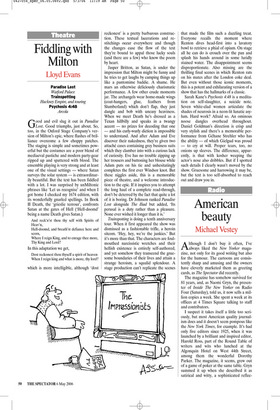Fiddling with Milton
Lloyd Evans
Paradise Lost Watford Palace Trainspotting Hackney Empire, and touring Psychosis 4:48 Arcola Good and evil slug it out in Paradise Lost. Good triumphs, just about. So, too, in the Oxford Stage Company’s version of Milton’s epic, where flashes of brilliance overcome a few choppy patches. The staging is simple and sometimes powerful but the costumes are a poor blend of mediaeval pastiche and modern party-gear ripped up and spattered with blood. The ensemble playing is very strong and at least one of the visual settings — where Satan surveys the solar system — is extraordinarily beautiful. But the text has been fiddled with a lot. I was surprised by unMiltonic phrases like ‘Let us recognise’ and when I got home I checked my 1674 edition, with its wonderfully gnarled spellings. In Book II Death, the ‘grieslie terrour’, confronts Satan at the gates of Hell (‘Hell-doomd’ being a name Death gives Satan.)
And reck’n’st thou thy self with Spirits of Heav’n, Hell-doomd, and breath’st defiance here and scorn, Where I reign King, and to enrage thee more, Thy King and Lord?
In this adaptation we get,
Dost reckonest thou thyself a spirit of heaven When I reign king and what is more, thy lord?
reckonest’ is a pretty barbarous construction. These textual lacerations and restitchings occur everywhere and though the changes ease the flow of the text they’re bound to appal those lucky souls (and there are a few) who know the poem by heart.
Jasper Britton, as Satan, is under the impression that Milton might be funny and he tries to get laughs by camping things up like a pantomime baddie. A shame. He mars an otherwise deliciously charismatic performance. A few other crude moments jar. The archangels wear home-made wings (coat-hangers, glue, feathers from Slumberland) which don’t flap, they just dangle and bob with uneasy heaviness. When we meet Death he’s dressed as a Texan hillbilly and speaks in a twangy accent — no prizes for decoding that one — and his curly-wurly diction is impossible to understand. And after Adam and Eve discover their nakedness, they’re given two attaché cases containing grey business suits which they clamber into with a curious lack of curiosity. Eve has no trouble zipping up her trousers and buttoning her blouse while Adam puts on his tie and unhesitatingly completes the first ever Windsor knot. But these niggles aside, this is a memorable piece of theatre, and a welcome introduction to the epic. If it inspires you to attempt the long haul of a complete read-through, don’t be deterred by the fact that quite a lot of it is boring. Dr Johnson ranked Paradise Lost alongside The Iliad but added, ‘Its perusal is a duty rather than a pleasure. None ever wished it longer than it is.’ Trainspotting is doing a tenth anniversary tour. When it first appeared the show was dismissed as a fashionable trifle, a heroin sitcom. ‘Hey, hey, we’re the junkies.’ But it’s more than that. The characters are foulmouthed narcissistic wretches and their hellish existence is entirely self-authored, and yet somehow they transcend the gruesome boundaries of their lives and attain a strange heroism, a squalid splendour. A stage production can’t replicate the scenes that made the film such a dazzling treat. Everyone recalls the moment where Renton dives head-first into a lavatory bowl to retrieve a phial of opium. On stage all he can do is crouch over the pan and splash his hands around in some luridly stained water. The disappointment seems disproportionate. Also missing are the thrilling final scenes in which Renton rats on his mates after the London coke deal. But even without those iconic moments, this is a potent and exhilarating version of a show that has the hallmarks of a classic.
Sarah Kane’s Psychosis 4:48 is a meditation on self-slaughter, a suicide note. Seven white-clad women articulate the shades of neurosis in a neon-lit lunatic asylum. Hard work? Afraid so. An ominous noose dangles overhead throughout. Daniel Goldman’s direction is crisp and very stylish and there’s a memorable performance from Géhane Strehler who has the ability — of which Gielgud was proud — to cry at will. Proper tears, too, no onions up sleeves. The difference, apparently, is that with kosher weeping the actor’s nose also dribbles. But if I spotted such details I clearly wasn’t moved by the show. Gruesome and harrowing it may be, but the text is too self-absorbed to reach out and draw you in.














































 Previous page
Previous page